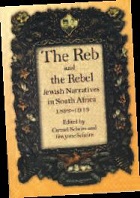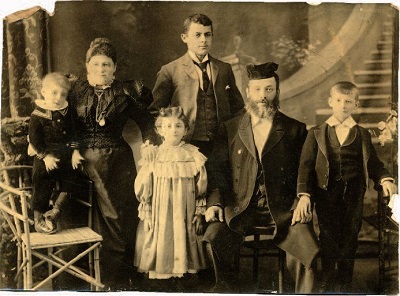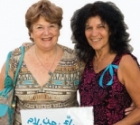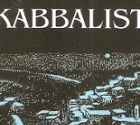
The Reb and the Rebel
Jewish narratives in South Africa 1892-1912
Edited by Carmel Schrire and Gwynnne Schrire
Reviewed by Gita Gordon
The Reb took Jewish way of life from Lithuania to South Africa. But it was a difficult journey
This is the story of a Jewish family who left Lithuania and went to South Africa, and how they fared. It is revealed in three autobiographical works. The first is a translation of the Hebrew diary written by Reb Yehuda Leib Schrire covering the period 1892-3.
In this diary, we see Yehuda Leib Schrire, a man of many talents, a man learned in Torah and The Haskalah, a cantor, a composer, a shochet, a bodek, a confectioner, an artist, a writer of learned articles and a novelist. Yet making a living in Lithuania was difficult.
The diary recounts that his brother-in- law sent him money to travel to South Africa to head the newly- formed breakaway Park shul in Johannesburg. Leaving his family, he travelled by wagon, rail, ship, and then rail and once again wagon, to the goldfields town of Johannesburg, a long and not particularly pleasant journey, all recalled in fascinating detail.
The shul was run by rich, upcoming men, and the job was a plum position. Unfortunately, there was a culture clash between the rich assimilated German and English Jews who ran the community and the fiercely observant man they had hired.
“The next day the head of the community came to talk to me and see my face. They spoke to me in the Ashkenazi language to which they were not accustomed, and they were all people of trouble. They were shaven! They had no payot. They asked me to cut my beard and my long hair.
“Your honor,” they said. “You are not in Lithuania any more. Over there they will not look at the clothes of the cantor and the reverend. The weightier the clothes and the longer the payot, the more honor would be given the person, but in Africa the very honored ladies will look at the reverend with seven eyes and if they do not like him, even though he continued to amaze the listeners with his singing and sweet words, all of this will come to nothing and to naught.
“I heard their words and I was amazed. My heart told me the future. These were not the kind of people with whom I should associate.”
And when the shul opened, he refused to attend the banquet for President Kruger because they would be serving “an abomination of a soup and non-kosher wine”.
He did not last long. Interestingly, though he was critical of the lax observance he found, he accepted the blame for the final parting.
“My brother-in- law and Ch. K. told me not to go there before the shammas came to get me.” No one came for him on the first day of Succos and so he prayed “in the beth ha-midrash”. The result was anger from the committee, and he was told, “the English do not expect cantors to pray every day”.
He had been expected. He had not arrived. His job was lost. The money he received was less than he had expected. Yet he says, “I realized that I had no justification to complain”. He had followed bad advice and now he accepted that he had erred.

Reb Yehuda Leib Schrire (seated) with his family pictured in 1897/8
He decided to return to Lithuania, but in Cape Town he was persuaded to serve a group of Litvaks opposed to the “Englisher” shul and the “Englisher” kashrut. His wife and family arrived in 1894 and settled in Barrack Street, District Six.
We learn of his early years in Europe and all the years that followed in his epic Hebrew poem Tolada. It consists of 150 verses of eight lines each. Details large and small emerge.
He tells of the shtiebel he formed in his house, of the Talmud Torah he created, the first in Southern Africa. He tells of his wife’s work, of financial success. He writes of leaving for Europe because of his wife’s illness, of the illness of his beloved daughter Annie. He writes of the return to South Africa, and of the post-war depression they found, culminating in their bankruptcy with the loss of all they had earlier gained.
In his epic poem, the following words are written:
“For thirteen years we had worked and labored / To accomplish something in the battle of life / And in the twitch of an eyeball we lost it all.”
Financially there was no recovery. Yet the contribution of Yehuda Leib, his wife and his family to the Cape Town community is immeasurable. He brought to the new immigrants of the community the learning and the warmth of the prayer house that was lacking in their lives. He saw that kosher meat was available. He built a mikvah. He was a key player in the formation of the Roeland Street shul, where new immigrants felt comfortable. He created the first Talmud Torah in South Africa and the first Zionist Society in Cape Town.
When he had arrived, Jewish life had been dominated by the Gardens shul and the Anglo-German Jewish
establishment. His striving to help immigrants like himself ultimately made the Cape Town Jewish community what it still is today – a combination of English decorum, Litvish warmth and love of learning and Zionist commitment.
Yet he ends his epic poem like this:
“Towards this purpose we aimed / To make aliyah and be shown the best of lands / It is the land of our ancestors, lovely land / To live there in tranquil peace... Since in all the time we spent / In South Africa - which we had chosen / This was the only aim we had in mind / And these were the things we discussed: / We wish we could be in the land of our forefathers / In the holy city which was reunited. / To the despair of our minds we have not succeeded / And to this day it remains the only objective.”
The third section of this book consists of the humorous memoirs of his youngest son, Harry, the rebel, and it covers his childhood in Cape Town and his pranks. He provides a detailed picture of the early years in South Africa of poor immigrant Jews and their sons. He tells of those who became important men of commerce, industry and the professions.
Always supporting the family, we see Gela Schrire, Yehuda Leib’s wife, Harry’s mother, businesswoman, charity collector, matriarch, holding the family together, helping those in need.
These three very different autobiographical works, never published before and never intended for publication – the diary, the poem and the memoir – have one common thread: their total honesty. In an age of PCs and Photoshop this is a precious gift. It lets us see back in time, providing an accurate portrayal of those far-off days.
This book is the collaborative effort of the Schrire family. It tells only part of the story of the great contribution the Schrire family has made, not only in South Africa and in Israel, but worldwide. More than that, the end of the book has a genealogy of the Schrire descendants. They, in their turn, seem to have inherited the talents of this brave couple, and made contributions in all fields, worldwide. This too is a legacy of Yehuda Leib and Gela.
Maybe, who knows, mistakes were made in their lifetime. Let it be remembered that in a time of great uncertainty the family made a decision to settle in South Africa. Maybe not everyone in that country loved Jews. But let it be recorded also that Jews were treated fairly and prospered there.
 Chanukah 5777
Chanukah 5777 Advertisers Directory 187
Advertisers Directory 187 ‘Give Peace a Chance’ Duo at Ceremony
‘Give Peace a Chance’ Duo at Ceremony Robert Kwong at the Yeshiva
Robert Kwong at the Yeshiva  Friday Night with the Pope - A Book Review
Friday Night with the Pope - A Book Review The Kabbalist - A Book Review
The Kabbalist - A Book Review